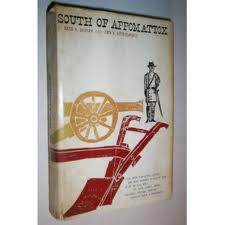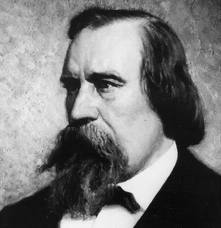
A Little More on Marshal Pierce and Lucius Quintus Cincinnatus Lamar
 I still haven’t figured out what became of James and Lizzie Pierce, but dug up an old book called South of Appomattox by Nash K. Burger and John K. Bettersworth.   The book is subtitled Ten Great Confederate Leaders and What Happened to Each of Them After the Civil War. Our Marshal, while not mentioned by name, makes a couple notable appearances in conjunction with L.Q.C. Lamar, who is one of the ten great Confederate leaders covered in the book.
I still haven’t figured out what became of James and Lizzie Pierce, but dug up an old book called South of Appomattox by Nash K. Burger and John K. Bettersworth.   The book is subtitled Ten Great Confederate Leaders and What Happened to Each of Them After the Civil War. Our Marshal, while not mentioned by name, makes a couple notable appearances in conjunction with L.Q.C. Lamar, who is one of the ten great Confederate leaders covered in the book.
This book covers the courtroom fight – with a quite a different spin, and offers some additional information as well:
On Jne 22, 1871, Lamar became embroiled in a courtroom roughhouse with a disreputable government witness, a former counterfeiter, embezzler, and murderer, who interrupted and threatened him, even starting to draw a pistol conspicuously displayed at his waist. Lamar picked up a chair and declared that if the judge wouldn’t make the witness sit down, he would. In the confusion Lamar knocked down and broke the jaw of a well-meaning Federal marshal who attempted to intervene. Federal troops stationed in the building were called in. Lamar spoke bitterly to the judge for permitting the situation to develop and denounced Federal officers who were threatening to arrest him. Finally order was restored without further violence. “We never saw a better fight or heard a better speech,” said one of the Federal soldiers.
Lamar apologized for his part in the disorder, especially to the marshal whom he had knocked down, but the judge temporarily disbarred Lamar from practicing in his court. The injured marshal testified for Lamar, pointing out that he had prevented a threatened riot in Oxford during the 1869 election and had always been a force for law and order in the community. The radicals, North and South, seized on the incident as an example of Southern troublemaking, part of Ku Klux plot.
Lamar ended up running for Congress in 1872. He didn’t want to, but was so disgusted with the partisan politics of the time that he felt called to do something about it. Since he was a former Confederate officer and public official, he was actually disqualified for office, except by a special act of Congress. He was nonetheless, elected as the first Democrat to be seated from Mississippi since Appomattox.
Lamar’s intellectual brilliance, his power as a speaker, his gentlemanly conduct to friend and foe alike, won him not only the normal Democratic vote but considerable Republican support as well — including the vote of the Republican United States marshal whom he had knocked down in the Oxford courtroom.
 Lamar went on to broker the compromise of 1877 (which was almost certainly the catalyst of the resignation of our Marshal James H. Pierce), serve in the Senate, as Secretary of the Interior, and finally as a Supreme Court Justice.  But it was Lamar’s devotion to the Constitution – even as a Confederate officer that stood out for me as I read the following:
Lamar went on to broker the compromise of 1877 (which was almost certainly the catalyst of the resignation of our Marshal James H. Pierce), serve in the Senate, as Secretary of the Interior, and finally as a Supreme Court Justice.  But it was Lamar’s devotion to the Constitution – even as a Confederate officer that stood out for me as I read the following:
To the grave he bore in his right hand a copy of the United States Constitution he had carried with him for many years. To many that document had been a holy thing.  Some had worshipped[sic] it; some had called upon it, as to a saint, to do their special bidding; some had presumed to interpret it as they would Scripture; and some had considered it entirely capable of working miracles. Perhaps all were right. Certainly Lamar’s veneration for it was something more than a lawyer’s quest for ultimate law or politician’s last resort for winning arguments. … Lamar had lived with this Constitution for years, carrying it as it were, next to his heart, as soldiers do Testaments to ward of bullets. When the Union was sundered in ’61, he would have no new constitution, only the old one kept inviolate like a cherished relic. When the Union was restored in ’65, he could see no other course but a rigid adherence to the ancient gospel which had reconciled a disunited Republic in 1787 and must become the only workable basis for the reconciliation of a divided Union scarcely a century later.
And that’s all I have for now, although I have dispatched a friend in MD to the National Archives at College Park! I’ve also ordered another book, Mormons and Cowboys, Moonshiners and Klansmen: Federal Law Enforcement, in hopes of finding out a bit more about Marshal Pierce.
 The posts are coming!
The posts are coming!


2 comments
Lucius seems to have grown wings and a halo since the last time.
[Reply]
Martin Reply:
March 20th, 2011 at 11:38 am
In history, like anything else, one has to look at the whole context of a situation. The same is true for a man’s life. I’d hate to be judged on the basis of one incident or action. It’s interesting that Pierce actually voted for Lamar and supported his candidacy for congress.
Based on my acknowledged limited reading and knowledge thus far, it seems to me that Lamar was a pretty good guy over all.
[Reply]
Leave a Comment